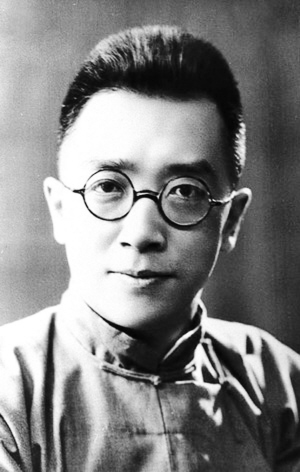A Chinese scholar's close ties with Columbia University
- By Wu Jin
 0 Comment(s)
0 Comment(s) Print
Print E-mail China.org.cn, March 13, 2017
E-mail China.org.cn, March 13, 2017
The 100th anniversary of the graduation of China's late prestigious scholar Hu Shih from Columbia University was celebrated at the Columbia Global Centers in Beijing, on March 11, 2017.
|
China's late prestigious scholar Hu Shih [File photo] |
A slew of memorial photos, documents and credentials were put on display at the Columbia Global Centers in Beijing to mark the 100th anniversary of the graduation of China's late prestigious scholar Hu Shih from Columbia University on March 11.
The exhibition – initiated by Song Xiaoxia, a professor from China Central Academy of Fine Arts – is in an attempt to review the Chinese intellectual history of the 20th Century.
In its opening ceremony on Saturday afternoon, Professor Ouyang Zhesheng from the History Department of Peking University delivered a keynote speech on Hu Shih's academic years at Columbia University.
Ouyang said Hu's life had three major turning points – his childhood in Anhui Province, where he finished his education of Chinese classics, his overseas academic years spent in Columbia University and his rise to prominence at Peking University.
"The study of Hu is not simply a personal issue but a wider vision of the cultural exchange between China and the United States," Ouyang said.
A beneficiary of the Boxer Indemnity Scholarship Program, Hu set out to the United States in 1910 to study agriculture at Cornell University. But uninterested in his classes, he shifted to philosophy for his postgraduate education in 1915, choosing the widely-renowned John Dewey as his mentor at Columbia University. The student and the professor established a lifetime friendship that grew immensely two years later upon Hu's graduation, when he became Dewey's full-time interpreter during the latter's two-year stay in China.
By combining foreign philosophies with early Chinese thoughts, Hu's PhD dissertation was entitled "The Development of the Logical Method in Ancient China." Despite the skepticism about when he exactly finished his paper, Hu remained prominent by introducing ancient Chinese wisdom in a well-written language to foreign audiences. According to Hu, the inspiration came from Dewey's training of instrumentalism.
Few contemporaries of Hu ever imagined to combine modern science methodology with ancient Chinese textology. He was the first to undertake such an attempt, which Hu said should be indebted to the training from Dewey in an interview for the compilation of "The Personal Reminiscences of Dr. Hu Shih," an oral history program initiated by Columbia University in 1957.
"Our life today is much more complicated than the times when Hu Shih lived, so we should neither overestimate nor underestimate his contributions," Ouyang said in his opening remarks.
"But we need to pay equal attention to the historic legacy while respecting the work of our predecessors who have laid a foundation from which we can continue to march forward."
The exhibition was held at Lifangting Plaza, No.1 Shanyuan Street, Zhongguancun.







Go to Forum >>0 Comment(s)